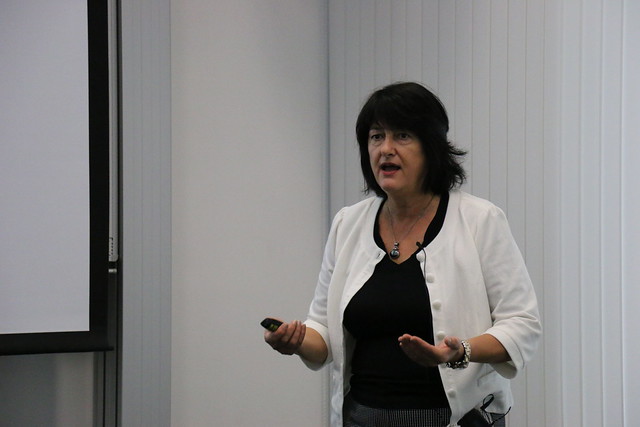Diets in Transition: Urbanization & Processed Food in the Heart of Malnutrition Crisis in Emerging Asia’s Countries
SHARE THIS

| Regina Moench-Pfanner (ibn360 Pte Ltd) | |
| Friday 18 November 2016 at 11:00 am - 12:00 pm (Hong Kong time, GMT +8) | |
|
IAS2042, 2/F, Lo Ka Chung Building, Lee Shau Kee Campus, HKUST |
Video
Key insights
Emerging market countries are improving food security at the expense of their health. The 2016 Global Nutrition Report details growing malnutrition and obesity in developing Asia. Together they are known as the double burden of food- related disease, and have become the new norm. Diabetes and related illnesses are rising and sedentary, city lifestyles are making things worse. Now, vitamin and mineral deficiencies are emerging as a third burden.
Regina Moench-Pfanner, Chief Executive Officer of ibn360 Pte Ltd, points out that ill effects are not only health-related. Malnutrition harms productivity as well. Studies estimate that poor nutrition is costing Asia and Africa 11% of GDP every year.
Despite the looming nutrition crisis, a substantial population still suffer from undernutrition. Cheap, calorie-dense, but nutritionally bankrupt foods are becoming more prevalent in modern diets – especially in emerging Asia. People living in cities now outnumber those living in rural areas and studies suggests a convergence in urban and rural consumer demand for processed foods in developing Asian countries.
Although dietary habits are mainly to blame, the market also plays an important role. The most profitable food tends to be the worst for health.
Luckily, processed foods can be designed to be both economical and nutritious – through micro-nutrient fortification. We already fortify emergency rations – used by aid workers to treat starving children. Used properly, food fortification can help close the nutrient gap.
However, malnutrition is a multi-faceted problem. Real, lasting change needs to involve governments, academia and the food industry. They are the main drivers in the research, development and production of our food supply.
Dr Moench-Pfanner explains how most food-related illnesses faced by emerging markets are caused by improper nutrition, not inadequate nutrition. She points out that we already have the expertise to have both health and abundance. She advocates for both food security and nutritional security. She argues change must involve gradual, research-driven improvements. Disruptive innovations can shift both food production and consumption towards improved nutritional outcomes, not just economical ones.
Abstract
Despite the vibrancy of emerging markets in Asia, nutrition and health statistics remain alarming. Recently, the Global Nutrition Report (2014-16) describes a new norm of malnutrition: obesity and non-communicable diseases are on their rise, while a substantial proportion of people still suffer from undernutrition. People living in cities now outnumber those living in rural areas and research suggests a convergence in urban and rural consumer demand for packaged or processed foods within low- and middle-income Asian countries. How economics favors the production of cheap, energy-dense but nutrient-poor foods and their growing contributions to modern diets in low- and medium-income populations are both important factors in the growing double-burden of malnutrition and disease. All sectors involved in the food and nutrition value-chain need to work together to achieve the research-driven incremental improvements and disruptive innovations that shift the factors of food production and consumption towards improved nutritional and health-related outcomes.
About the Speaker
Dr Regina Moench-Pfanner is an international nutrition specialist with more than 30 years’ experience in the nutrition and health sector. She has and continues to serve as Advisor to governments, NGOs, the food industry and the media on areas including food fortification, nutrition program interventions and the complex dual burden of undernutrition and obesity. She has held regional and national roles with leading NGOs in the emergency and development sector, including the Red Cross and Red Crescent Society, Helen Keller International and the Global Alliance for Improved Nutrition. At the global level, Dr Moench-Pfanner has brokered many noteworthy public-private-civic partnerships. She is a Fulbright Scholar, holds a MSc in International Nutrition, Michigan State University, USA and a doctorate from the University of Bonn, Germany. Regina has published and co-authored over 60 peer-reviewed papers and is a Board Member of the Rice Bowl Index, which monitors food security in Asia.
Slides
Photos
Get updates from HKUST IEMS







